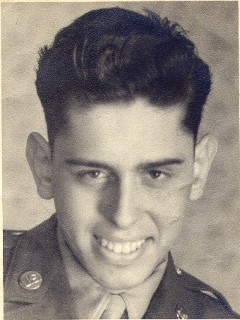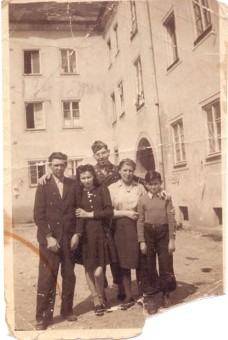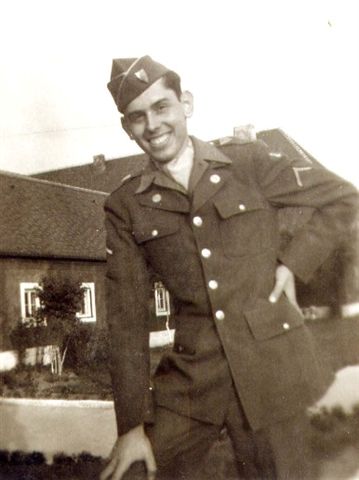 The United States
Constabulary
The United States
Constabulary
U.S. Army of Occupation
Germany and Austria
1946

Paul Feuer
I enlisted in the U.S. Army after graduating from Erasmus Hall High
School in Brooklyn, New York at the age of 17 in June 1946. After a
brief stay at the Ft. Dix, N.J. replacement depot, I was shipped off
by train to Ft. Jackson, S.C. for basic training. The cadre there
were battle-hardened veterans of the 82nd Airborne Division and
Patton's Third Army and spared us none of the rigors of basic training.
Upon completion of our training, most of us were sent overseas for
duty in Korea. However, I was sent to Camp Kilmer, N.J. the port of
embarkation for the ETO. After 28 miserable stormy, icy January days
in the hold of a World War 1 Liberty ship converted into a troop
transport, we landed in Bremerhaven, Germany. There I spent some time
in an Army hospital recovering from pneumonia I contracted during that
hellish sea crossing.
Upon my recovery I found myself on a troop train headed south to the
American occupation zone of Austria -- the Land Upper Austria Area
Command (LUAAC), under the command of Brig. Gen. Loyal Haynes.
During the train ride south, I thought I would get to see some of the
German countryside, but the railroad sidings were piled two stories
high with the remains of bombed-out buildings, wrecked trains and
shot-down aircraft. It was as if we were riding in a tunnel all the
way through Germany. When we stopped in Frankfurt, I got off in the
Bahnhof (train station) which was nothing but a pock-marked concrete
platform with twisted girders overhead. I did a 180-degree turn and
as far as the eye could see, not a single intact building was
standing. So much for Hitler's thousand-year Reich.
An exception to this bleak picture was when we passed the medieval
town of Marburg, with its fairytale castle on the top of a hill and
old men walking around in lederhosen.
Austria had escaped much of the damage that had been inflicted on
Germany, but it was still apparent. I ended up in Linz, Hitler's
boyhood home that he intended to make the cultural capital of his
Grossdeutschesreich, or greater Germany. It also happened to be my
grandfather's boyhood home. The picturesque old town belied its more
sinister nature. Hidden underground were the vast Hermann Goering
steel works, and above ground were the barracks of the slave laborers
who worked and died there. A short distance out of town was the
infamous Mauthausen death camp, where untold hundreds of thousands of
Jews and other undesirables were cruelly murdered. Linz was also the
home of the Bindermichl DP Lager (Displaced Persons Camp), where
thousands of unfortunate survivors of the Holocaust were cared for by
the Americans until some country could be found to accept them. Some
went back to their homes in Poland and Lithuania where they were
murdered by their erstwhile neighbors. Most wished desperately to go
to the United States (which wasn't taking many) and failing that, to
the British mandate of Palestine.
Upon arriving in Linz, I was assigned to barracks at the former
Luftwaffe base at Horshching, just outside the town. The barracks
were a far cry from the flimsy and cheerless American barracks back in
the States. The German barracks were attractive, solidly-built
one-story brick buildings with peaked roofs. Soldiers slept in
comfortable semi-private rooms. The Germans certainly knew how to
treat their soldiers. At the entrance to each building was a circular
mural over the front door. It showed heroic Germanic warriors waving
what was originally the Nazi swastika flag. However the Americans had
painted out the swastika and substituted an American eagle for a very
strange effect.
The unit I was assigned to initially was "E" Troop, 24th Constabulary
Squadron, 4th Constabulary Regiment. While in "E" troop I performed
several functions. One important function was to patrol the border
between the American and Soviet occupation zones, which were divided
at the Danube River. I must say I enjoyed bridge patrol. There I had
an opportunity to try to converse with the Soviet soldiers on the
other side of the border. They were fascinated with Mickey Mouse
watches and had an insatiable appetite for them. "Meeky Moose! Meeky
Moose!" they would exclaim if you brought them one from the PX. They
would give you just about anything for one of those watches.
When we got off duty we had to turn our weapons in to the orderly
room. Not the Russkies. They kept their automatic weapons with them
at all times. On Saturday nights they would get drunk on Vodka and
start firing their rifles across the river at nothing in particular.
After a while you made sure to stay away from the river on Saturday
nights.
For a while, I was stationed in the Linz Polizeiamt, or police
station. There I walked a beat with an Austrian policeman. All the
police were Wehrmacht veterans, and I used to ask each of them the
same question: "Now that Germany has been defeated, what do you think
of Hitler?" They all gave the same answer, almost word for word:
"You understand, I vas never a Nazi. But, Hitler was good for
Germany. He gave us back our pride, he built roads, he created jobs. He
vas betrayed by the generals."
After a while walking a beat, I was given a cushy job handing out
civilian drivers licenses. I couldn't drive and didn't know the
traffic laws, but that didn't matter. They gave me a pile of forms
and an official-looking stamp. The only discomfiting part of the job
was the bronze Nazi eagle, complete with swastika, that still stood on
top of the filing cabinet!
Another job for "E" Troop was to go to Bindermichl every Friday and
take a head count so the following week's rations could be
apportioned. One Friday I knocked on a door at Bindermichl and found
a raggedly-looking family inside. There were a man and his wife, a 15
year-old girl and a 12 year-old boy. I spotted a beaten-up photograph
of a man tacked on the wall. He looked familiar. I walked over and
looked at it more closely. I was shocked that it seemed to be a photo
of my uncle, who was back running his drugstore in Springfield
Gardens, N.Y.!
Speaking in my broken Yiddish, I discovered that this family was
indeed related to my uncle (by marriage). My family in Europe had
been wiped out during the Holocaust and it was a shock to find not
only a survivor, but an entire family. In the ensuing weeks I raised
some money from my family, bought the relatives clothes and other
necessities from the PX, and contacted the local Haganah
representatives, who were successful in smuggling them into Palestine
under the noses of the British blockade.
After several months of this duty, I was transferred to HQ & HQ
Company, 24th Constabulary Squadron. It had come to the attention of
the captain that I was an amateur artist. So I became the official
unit artist. This involved hand-lettering invitations and place cards
for the general's parties, painting the big billboards with the
crossed sabre unit insignia that stood at the base gate, drawing a
comic strip for the unit newspaper, and painting VD posters. To
prepare for this job I had to accompany a doctor to the base hospital
and watch him do short-arm inspections of venereal disease patients,
both make and female. They liked graphic VD posters.
In March 1948 I was transferred back to the States.
See photos attached. The group picture shows me with the Pinczuk
family in the courtyard of the Bindermichl DP Lager. These are my
uncle's relatives. In the other standing picture I am in front of my
quarters in the barracks at Horsching.
Paul S. Forbes
[Feuer]
9321 Millbranch Place
Fairfax, VA 22031-1922
703/385-4417
E-mail: pforbes@cox.net
Pinczuk
family
Paul Feuer
This page has been
updated Feb.,09,2006
Back

 The United States
Constabulary
The United States
Constabulary

